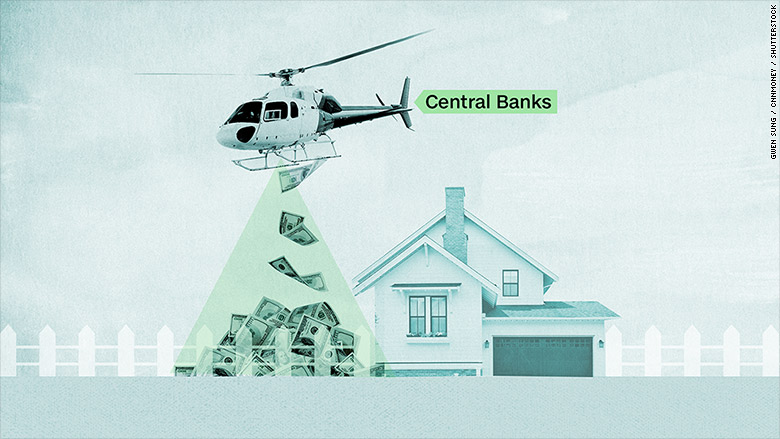
It's only a matter of time before global central banks resort to a last-ditch option known as "helicopter money" to breathe life into the slumping economy.
At least that's what influential investor Bill Gross warns in his latest depressing letter to investors.
Gross, a fund manager at Janus, wrote on Wednesday that he thinks global central banks -- including the U.S. Federal Reserve -- will be forced to do the economic equivalent of dropping money from helicopters.
"The alternative is an immediate visit to austerity rehab and an extended recession. I suspect politicians and central bankers will choose to fly, instead of die," Gross wrote.
Helicopter money, a term first introduced by famed economist Milton Friedman in 1969 and later championed by Ben Bernanke, essentially involves a central bank writing a fat check to the Treasury to pay for stimulus like tax rebates.
Related: What the heck is helicopter money?
Even though most economists see this last-ditch option as unlikely, Gross thinks they're underestimating the millions of jobs likely to be wiped out by technology and robots. He pointed to the negative impact on the labor force from self-driving cars, robo-advisers and automated manufacturing.
"Virtually every industry in existence is likely to become less labor intensive in future years," Gross wrote.
The solutions for this robot future are difficult, expensive and not really being talked about by politicians right now.
"We listen to Trump and Bernie, then Cruz and Hillary as if one of them might be the mythical Wizard of Oz, guiding us down that yellow brick road to reinvigorate growth," Gross wrote.
Instead of talking about free college, retraining workers or building a wall along the border with Mexico, Gross thinks politicians need to start thinking about Universal Basic Income or UBI. It is a controversial idea that is basically a new social safety net to compensate for the long-term loss of jobs due to technology. Gross believes UBI is coming in the next decade and could cost $10,000 per citizen, or $1 trillion to $2 trillion.
Related: Robots could kill 30% of bank jobs
Given the negative side effects of raising taxes or adding on more debt, Gross thinks this new spending program will need to be paid for with helicopter money. He says in some ways central banks in the U.S., Europe, Japan and the U.K. have already done this by launching massive bond-buying programs known as quantitative easing, or QE.
"I believe that for now central banks will print more helicopter money via QE (perhaps even the U.S. in a year or so)," Gross wrote.
That would be a dramatic reversal for the Fed, considering just five months ago the U.S. central bank was planning to RAISE rates four times this year. Even though the Fed has scaled back those plans to cope with global headwinds, it's still on track to remove stimulus, not add to it.
Gross thinks helicopter money is coming, but he does believe it has some big costs. That includes higher inflation, potential market bubbles and further entangling monetary and fiscal policy.
While central bankers won't want to give up their independence, Gross said "that may just be the price they will pay for a civilized society."
So what does all of this mean for your portfolio? If he's right, Gross believes investors should brace for "renewed QE" from the Fed, a period of prolonged low rates and "artificially high" markets.
In other words: what could go wrong?
--CNNMoney's Patrick Gillespie contributed to this report.


